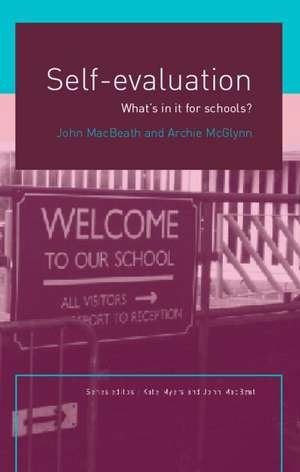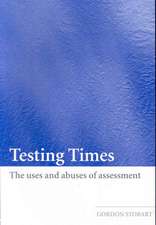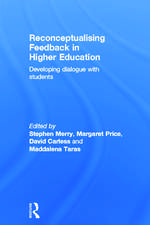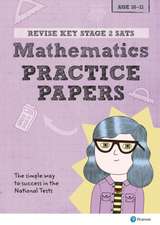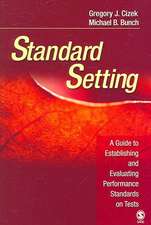Self-Evaluation: What's In It For Schools?: What's in it for schools?
Autor John MacBeath, Archie Mcglynnen Limba Engleză Paperback – 28 mar 2002
Self-Evaluation: What's in it for Schools? demystifies school self-evaluation and encourages schools to be self-critical and self-confident. The book helps schools and teachers develop the necessary confidence to work with evaluation tools. Accessible and packed with case studies, it tackles the issues that are at the forefront of the national agenda in most countries in Europe. Challenging ideas for the future are given through discussion of the concerns and issues of schools in the present day.
Preț: 298.15 lei
Nou
Puncte Express: 447
Preț estimativ în valută:
57.05€ • 59.57$ • 47.11£
57.05€ • 59.57$ • 47.11£
Carte tipărită la comandă
Livrare economică 15-29 aprilie
Preluare comenzi: 021 569.72.76
Specificații
ISBN-13: 9780415277426
ISBN-10: 0415277426
Pagini: 160
Ilustrații: 14 tables
Dimensiuni: 129 x 198 x 12 mm
Greutate: 0.18 kg
Ediția:New.
Editura: Taylor & Francis
Colecția Routledge
Seria What's in it for schools?
Locul publicării:Oxford, United Kingdom
ISBN-10: 0415277426
Pagini: 160
Ilustrații: 14 tables
Dimensiuni: 129 x 198 x 12 mm
Greutate: 0.18 kg
Ediția:New.
Editura: Taylor & Francis
Colecția Routledge
Seria What's in it for schools?
Locul publicării:Oxford, United Kingdom
Public țintă
Academic, Professional, and Professional Practice & DevelopmentRecenzii
'They provide an excellent resume of the progress UK schools have made in school improvement, setting out the principles for self-evaluation, and make a particularly good case for the importance of context.' - Times Educational Supplement
'Self evaluation is very readable and packs much into its 150 pages ... The book is very accessible and clearly set out with questions posed throughout to stimulate reflections and discussion. It might be read alone and/or used in collaboration with colleagues as a preparation for external inspection. More usefully in my view it can be used to encourage the notion that continuous self-evaluation makes for a more open and transparent culture, one in which each person is valued for what they contribute.' - Educational Review
'For the practitioner, there are numerous helpful, ready-to-use examples of self-evaluation instruments ... that could be used in school and classroom contexts ... Overall this is a valuable discussion of the how and why of school self-evaluation and there is no doubt that teachers, headteachers and others would benefit from extracting practical instruments and ideas from the various chapters of this book.' - Educational Research
'Self evaluation is very readable and packs much into its 150 pages ... The book is very accessible and clearly set out with questions posed throughout to stimulate reflections and discussion. It might be read alone and/or used in collaboration with colleagues as a preparation for external inspection. More usefully in my view it can be used to encourage the notion that continuous self-evaluation makes for a more open and transparent culture, one in which each person is valued for what they contribute.' - Educational Review
'For the practitioner, there are numerous helpful, ready-to-use examples of self-evaluation instruments ... that could be used in school and classroom contexts ... Overall this is a valuable discussion of the how and why of school self-evaluation and there is no doubt that teachers, headteachers and others would benefit from extracting practical instruments and ideas from the various chapters of this book.' - Educational Research
'Self evaluation is very readable and packs much into its 150 pages ... The book is very accessible and clearly set out with questions posed throughout to stimulate reflections and discussion. It might be read alone and/or used in collaboration with colleagues as a preparation for external inspection. More usefully in my view it can be used to encourage the notion that continuous self-evaluation makes for a more open and transparent culture, one in which each person is valued for what they contribute.' - Educational Review
'For the practitioner, there are numerous helpful, ready-to-use examples of self-evaluation instruments ... that could be used in school and classroom contexts ... Overall this is a valuable discussion of the how and why of school self-evaluation and there is no doubt that teachers, headteachers and others would benefit from extracting practical instruments and ideas from the various chapters of this book.' - Educational Research
'Self evaluation is very readable and packs much into its 150 pages ... The book is very accessible and clearly set out with questions posed throughout to stimulate reflections and discussion. It might be read alone and/or used in collaboration with colleagues as a preparation for external inspection. More usefully in my view it can be used to encourage the notion that continuous self-evaluation makes for a more open and transparent culture, one in which each person is valued for what they contribute.' - Educational Review
'For the practitioner, there are numerous helpful, ready-to-use examples of self-evaluation instruments ... that could be used in school and classroom contexts ... Overall this is a valuable discussion of the how and why of school self-evaluation and there is no doubt that teachers, headteachers and others would benefit from extracting practical instruments and ideas from the various chapters of this book.' - Educational Research
Cuprins
Chapter 1 Why Evaluate Schools?; Chapter 2 Internal and External Evaluation – Two Sides of a Coin; Chapter 3 Evaluating Teaching; Chapter 4 Evaluating Learning; Chapter 5 Evaluating Ethos and Culture; Chapter 6 Benchmarking; Chapter 7 Preparing for Inspection; Chapter 8 Evaluating Leadership;
Notă biografică
John MacBeath O.B.E. is Professor of Educational Leadership at the University of Cambridge. He is the author of Schools Must Speak for Themselves (Routledge, 1999) and numerous books on self-evaluation and school improvement.
Archie McGlynn was formerly HMCI in the Scottish Executive Education Department, and is currently a Director of the International Network for Educational Improvement and put in place the self-evaluation guidelines, ‘How Good is Our School?’.
Archie McGlynn was formerly HMCI in the Scottish Executive Education Department, and is currently a Director of the International Network for Educational Improvement and put in place the self-evaluation guidelines, ‘How Good is Our School?’.
Descriere
Self-Evaluation: What's in it for Schools? demystifies school self-evaluation. Accessible and packed full of case studies, it tackles the issues that are at the forefront of the national agenda in most countries in Europe.
